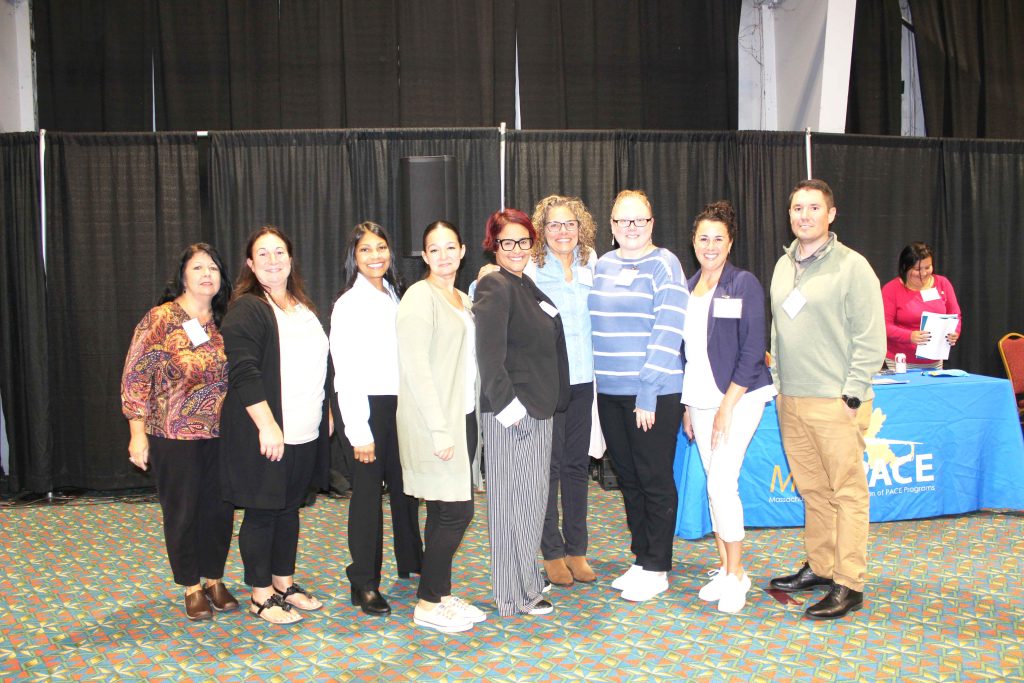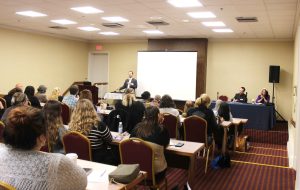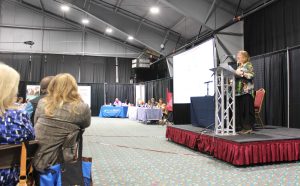 Coastline employees attend the Mass Aging Access Conference on Sept. 24. From left to right are: Karen Costello, Director of Quality and Education; Sylvia Nobre-Hilton, Chief Operating Officer; Dionne Gomes, Planning Assistant; Samantha Oliveira, Nurse Supervisor; Leslie Felizardo, Behavioral Health Specialist; Stasia Finney, Senior Care Options Manager; Heather Mello, Homecare Manager; Paula Roderiques, Contracts Manager; and Justin Lees, Chief Executive Officer.
Coastline employees attend the Mass Aging Access Conference on Sept. 24. From left to right are: Karen Costello, Director of Quality and Education; Sylvia Nobre-Hilton, Chief Operating Officer; Dionne Gomes, Planning Assistant; Samantha Oliveira, Nurse Supervisor; Leslie Felizardo, Behavioral Health Specialist; Stasia Finney, Senior Care Options Manager; Heather Mello, Homecare Manager; Paula Roderiques, Contracts Manager; and Justin Lees, Chief Executive Officer.

Mass Healthy Aging Collaborative Director James Fuccione presents at the Mass Aging Access Conference with co-presenters, Coastline Planning Director Zachary Boyer and Kathryn Downes of Massachusetts Broadband Institute (both seated at panel table).
Aging services professionals gathered in Boxborough in September for a day of networking, training on key aging topics, and discussion on program and funding opportunities.
More than 250 people attended the Sept. 24 conference which was the first in-person conference in five years, organized by Mass Aging Access, formerly called Mass Home Care.
The agency debuted its new name, new logo and website at the event, reinforcing its mission to advocate on behalf of older adults and people with disabilities and their caregivers; support access to home and community-based services; foster collaboration; help connect older adults and people with disabilities and their caregivers to a statewide network; work to ensure equitable access to services; and, help to coordinate services for older adults and people with disabilities through member agencies.
As part of its rebranding, Mass Aging Access is strengthening its role to help meet the growing demand for aging services and support, executive director Betsey Crimmins said, adding that the conference is a part of that goal.
“Whatever people have now, we want to make sure that three years from now, 10 years from now, 50 years from now, there’s still a strong system of services and supports for older adults to access,” she said.
“One of the things we tried to do (today), is orient the sessions toward workers on the ground,” she added. “It’s really training-focused and trying to get people the training and information they need.”
In addition to breakout sessions, those gathered heard from the Executive Office of Elder Affairs Acting Secretary Robin Lipson about three partnership programs that have been supporting older adults across the state.
First, Community Transition Liaison programs is now available statewide, Lipson said. These programs are uniquely positioned to support the complex needs people have as they move back to the community from nursing facilities. Similarly, the Hospital to Home partnership is up and running with 13 Aging Services Access Points partnering with 15 hospitals to support hospital patients as they transition directly to home after discharge, she said.
And third, the newly branded, Behavioral Health Outreach for Aging Populations, formerly known as Elder Mental Health Outreach Teams now includes 18 BHOAP community partners, many of which are ASAPs that offer the program in 211 cities and towns, she said.
“Our goal is to expand the service even further,” Lipson said.

Acting EOEA Secretary Robin Lipson addresses Aging Services Access Points professionals at the conference.
Lipson also congratulated Mass Aging Access on its new name. “We’ve all learned how much the words we use matter,” she said. “What we call ourselves and how we describe ourselves directly impacts our consumers and our partners and your new name truly captures what you do and who you are.”
EOEA is in the final legislative stages of changing their name.
Bob Blancato, president of Matz, Blancato and Associates, and a strong advocate for aging services based in Washington D.C., gave attendees a legislative update for the coming federal fiscal year, including pushing for advocacy around the reauthorization of the Older Americans Act, the continued need for increased funding for existing services, and a move to create a national plan on aging.
In May, the Administration of Community Living submitted a report to Congress with a strategic framework for the plan, Blancato said, which includes four domains: age-friendly communities; coordinated housing in support of social services; increased access to long-term services and supports; and aligning healthcare and supportive services.

Recent Comments